Here is everything you need to know about baby-led weaning with sweet potato, from a pediatric registered dietitian. Whether you’re doing baby-led weaning, spoon-feeding, or a combination, this post will walk you through, step-by-step, how to introduce sweet potato to your baby.

Sweet potato is delicious starchy root vegetable packed with essential nutrients. It is simple to prepare and introduce to your baby as soon as they start solid foods! There are so many ways to offer sweet potato to your baby, and because it’s got a mild taste, it pairs perfectly with many flavors, herbs and spices (and can be served in so many different ways!). This makes sweet potato an ideal baby-led weaning option, and a great way to introduce various tastes and textures to your baby’s palate.
This guide will cover:
When to introduce sweet potato to baby
You can serve sweet potato to your baby as soon are they are showing all the signs of readiness to eat solids! For most babies this happens at around 6 months – this is right around the time that I recommend introducing solid foods. Check out this guide for important information on your baby’s readiness cues for baby-led weaning.
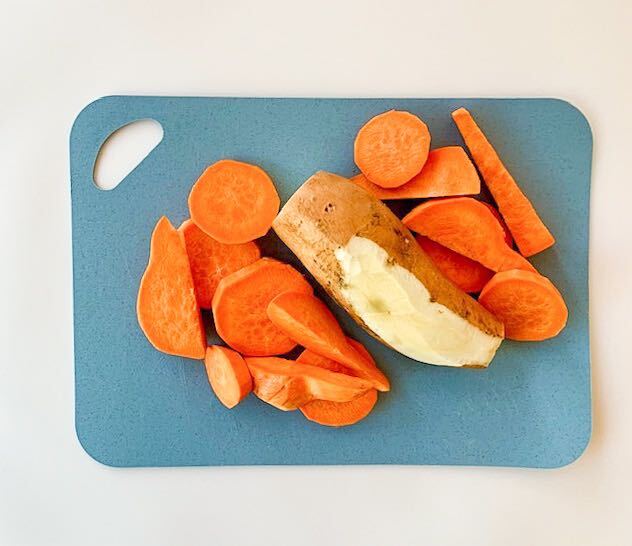
Why sweet potatoes are a great baby-led weaning food
The naturally sweet flesh of a sweet potato is an ideal baby-led weaning food, as it can be prepared and offered to your little one in many ways. This allows you to experiment with offering different textures and observing which option baby prefers. Exposing your baby to many (safe) textures as they progress through their eating journey helps them develop their chewing and swallowing skills. Exposure to baby to a variety of textures using the same food is a gentle way to teach them how to manipulate different textures in their mouth (which is important for mature oral-motor development).
One great thing about sweet potato is that its subtle sweet flavor is typically accepted and loved and by eating newbies. Not only that, sweet potato is packed with essential vitamins and minerals that are important for baby’s development and health.
The benefits of sweet potato for baby
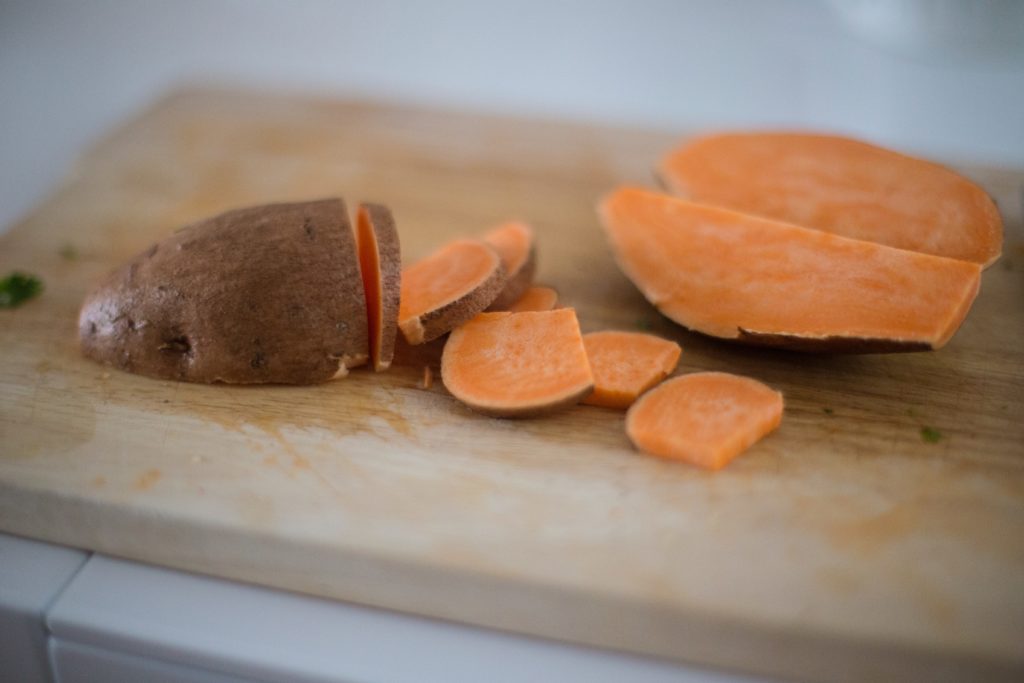
Vitamin A
Sweet potato is an excellent source of vitamin A, which is important for healthy vision, immune function and maintenance of organs in the body including the heart, lungs and eyes. Sweet potato is also high in vitamin B6 as well as the minerals potassium and manganese. All of these nutrients are essential to maintaining a healthy immune system (which as parents, we know is so important—there’s nothing worse than when your baby gets sick!).
Vitamin B6
Vitamin B6 is also needed for baby’s brain. Potassium is essential for almost every body function including muscle contraction, kidney and heart function as well as healthy nerve transmission.
Manganese
Manganese helps cells produce energy at the same time as protecting them from damage. It’s a mineral that is important for bone health and blood clotting.
Fibre
Sweet potato is also a great source of fibre providing about 4g in half a cup. Ensuring your baby get enough fibre while starting solids helps to regulate bowel movements and prevent constipation. Fibre also helps fuel healthy bacteria in your baby’s tummy promoting the foundation of a healthy gut microbiome as they grow!
How to serve sweet potato to baby
Sweet Potato Puree/Mash (6-7 months)
Mash cooked sweet potato (see below for how to cook sweet potato) with a fork for a thicker/chunkier texture. For more of a puree add the flesh to a blender or food processor. Add small amount of water to bring it to desired consistency. Your baby may prefer a thinner pureed texture to start before progressing to a chunky mash.
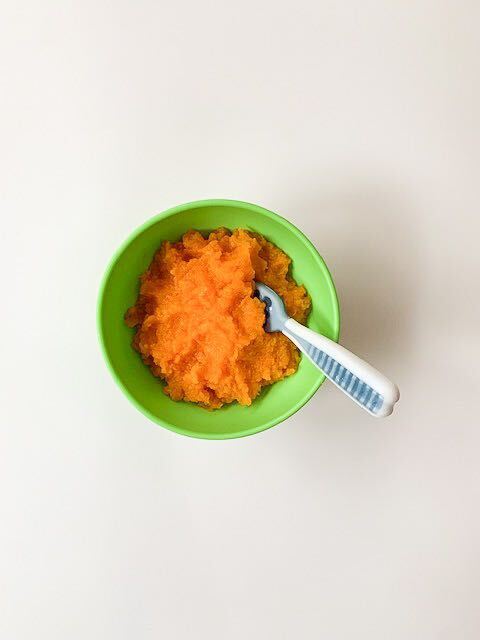
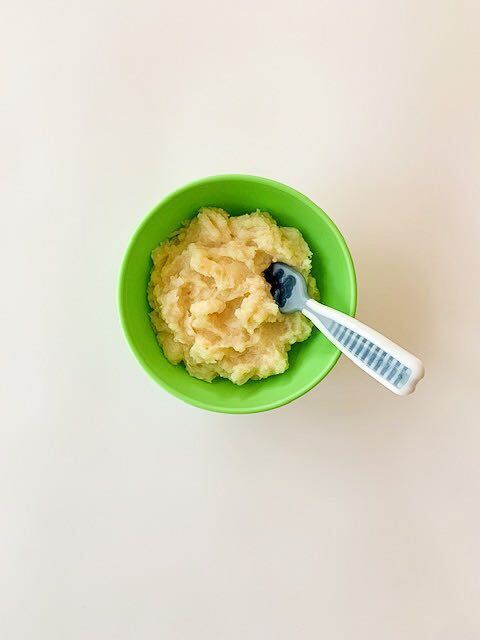
Roasted Wedges or Rounds (6-7 months)
See below how to prepare roasted sweet potato wedges for baby. Feel free to experiment with flavor and add dried herbs or garlic powder to the sweet potato wedges before roasting them in the oven. The finger like wedges are great for baby-led weaning since they are an easy shape for baby grasp and to bring to their mouth at meal time.
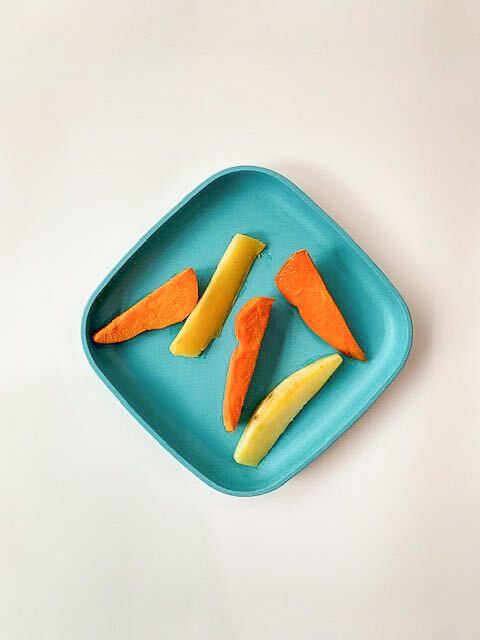
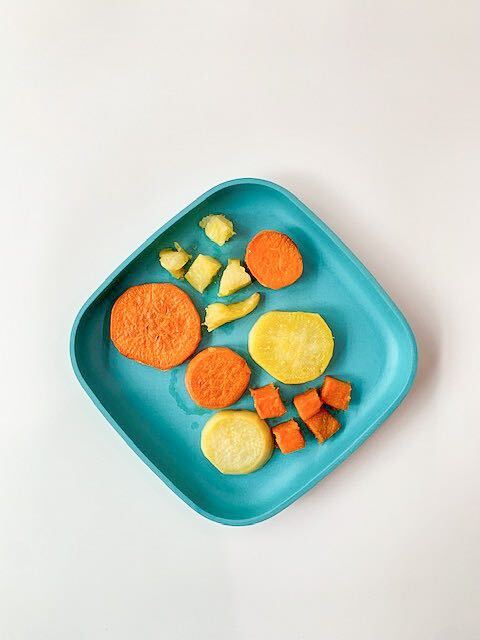
Sweet Potato Spread on Toast (8-9 months)
Spread a thin layer of mashed sweet potato on whole grain toast. Slice the toast into finger-like strips that are easy for baby to grasp in their tiny fist to bring to their mouth.
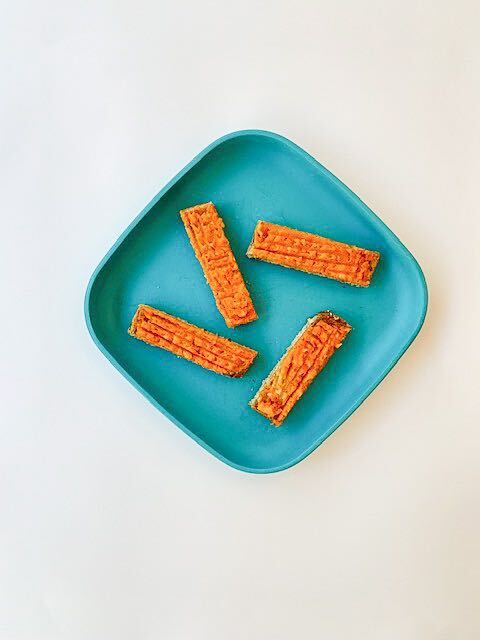
Sweet Potato and Avocado Lentil Mash or Fritters (8-9 months)
Mix ½ cup of mashed sweet potato with ½ medium mashed avocado and 1/3 cup of drained, canned lentils. You can simply serve this to baby without transforming the mash into fritters. If you decide to make fritters, whisk 1 egg and mix it into the sweet potato mixture. Use a small ice cream scoop or ladle about 2 tbsp of mixture onto a well-oiled non-stick pan. Cook fritters on medium-high heat until slightly browned on both sides. Serve cooled fritters to baby in whole form or chop into smaller pieces to help baby practice their developing pincer grasp.
Sweet Potato Pancakes (10-12 months)
Take ½ cup of mashed sweet potato and mix it with 2 eggs. Add in about ¼ cup of baby oatmeal and mix until everything is thoroughly combined. Cook small circular sweet potato pancakes on a buttered non-stick pan until slightly golden brown on both sides. Feel free to serve your baby tiny pancakes or large pancakes cut up into smaller pieces so that baby can practice pincer grasp.
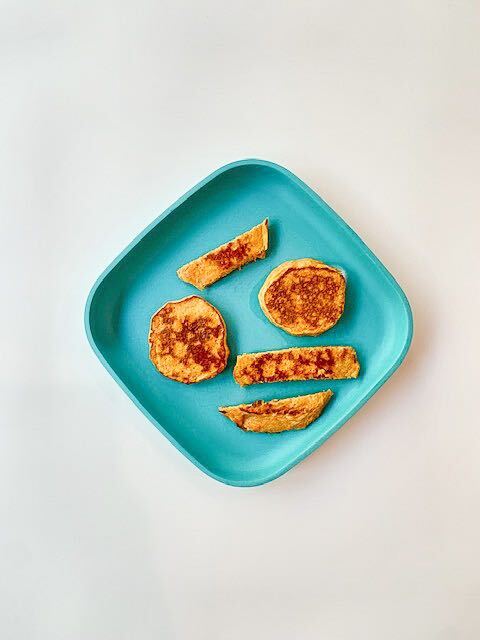
Sweet Potato with Cinnamon and Yogurt (10-12 months)
Mix mashed or pureed sweet potato into plain whole fat yogurt. Sprinkle in some cinnamon for a pop of flavor! Encourage your baby to practice self-feeding with a spoon. These Numnum pre-spoon gootensils work well for babies learning to self-feed and are great for thicker mashes or yogurts!
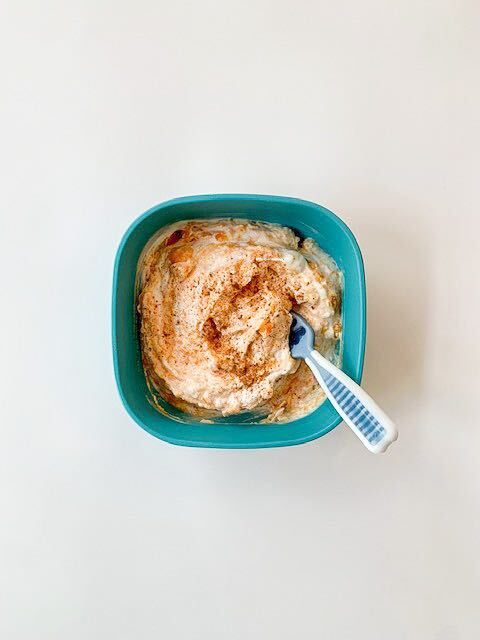
Ways to cook sweet potato for baby
Baked sweet potato– preheat your oven to 425°F. Rinse a medium sweet potato and wrap it in tin foil. Place it in an oven proof dish or pan before putting it into the oven for about an hour or until sweet potato is soft. After it has cooled you can unwrap your sweet potato and the peel will easily come off from the flesh.
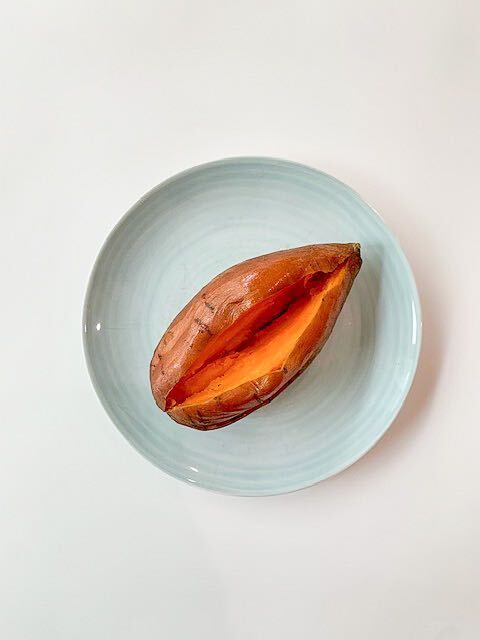
Boiled sweet potato– Peel sweet potato and cut up into similar sized 1-2-inch cube chunks. Place in a large pot and fill with water so that all the potato pieces are submerged. Bring to a boil for about 20-30 minutes or until the pieces of sweet potato are fork tender.
Microwaved sweet potato– Wash a medium sweet potato thoroughly under running water. Poke holes through the sweet potatoes skin a few times using a fork. Microwave on high for about 5 minutes or until sweet potato flesh will give in if squeezed slightly. Microwaved sweet potato is a quick alternative baking your sweet potato in the oven!
Roasted sweet potato wedges– Preheat your oven to 425°F. Peel sweet potato and cut into finger like wedges. Coat wedges in olive oil and place on a pan. Roast in the oven for about 25-30 minutes or until sweet potatoes are soft and fork tender.
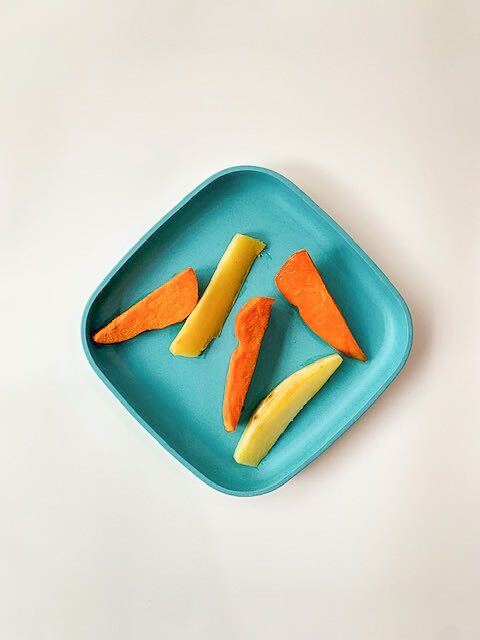
FAQ about starting baby-led weaning with sweet potato
Store whole uncooked sweet potatoes in a cool dry place and try to use them within a week of purchasing at the store. After cooking homemade sweet potato mash, wedges, pancakes/waffles, store in an air tight container in the fridge for up to 2 days or in the freezer for up to a month.
Sweet potato is not considered a typical choking hazard. It must be cooked to a soft mash-able texture so that your kiddo can squish the flesh between their gums without too much effort. Under roasted or cooked sweet potato wedges that are too firm to mash, may pose a choking risk for baby if they bite off a piece that could get stuck in the airway. You can test to see if your sweet potato is soft enough by gently squeezing it between two fingers to see if it squishes or not.
Yams and sweet potatoes are often considered interchangeable, however there are some distinct differences. A sweet potato is a starchy vegetable in the tuber family with many varieties grown worldwide. They range in colors from white, yellow, orange, and purple flesh. Yams are large edible root vegetables that originate from Africa and Asia. A thick brown bark-like skin surrounds the white or purple toned flesh.
Try introducing all of them! Or whatever you have available to you at your grocery store. All varieties of sweet potatoes provide similar health benefits. The deeper colored ones typically will have more nutrients and antioxidants packed into them! You may find some sweet potatoes have a creamier texture than others, while some may have a slightly sweeter taste. Experiment with the different types and notice if your baby has a preference!
Quick balanced snack combinations with sweet potato
- Sweet potato puree and whole fat yogurt
- Sweet potato wedges with leftover shredded chicken thigh
- Sweet potato mashed with beans and olive oil
- Sweet potato pancakes with nut butter
- Sweet potato wedges with salmon and avocado mashed together on the side
- Sweet potato mashed with hemp hearts and cinnamon
Combining sweet potato with a protein or fat-containing food will help baby to feel satisfied for longer until their next meal or snack. The carbohydrate from the sweet potato will digest more quickly. Adding fat or protein to the snack will help slow digestion and help fill your little one’s tummy. Healthy fats and protein also help to balance out your kiddo’s sweet potato snack with essential nutrients for growth and development!
Delicious baby-led weaning sweet potato recipe suggestions





/assets/images/provider/photos/2672875.jpg)

More Stories
Prevent Nearsightedness Complications With Early Treatment
FDA Clears Updated COVID-19 Vaccines for Kids Under Age 5
5 Ways to Support Your Microbiome During the Holidays